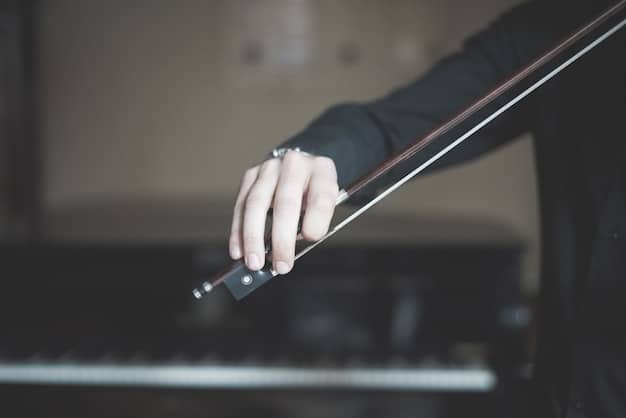Crafting the Finale: Composer’s Symphony & Emotional Resonance

The Composer’s Symphony: Crafting Original Scores That Evoke Emotion in Series Finales involves a deep understanding of narrative, character arcs, and emotional beats, resulting in a powerful and lasting impact on viewers.
The culmination of a television series is often marked by moments of intense emotion, character revelations, and dramatic storylines, and the music plays a pivotal role in amplifying these feelings. The Composer’s Symphony: Crafting Original Scores That Evoke Emotion in Series Finales involves carefully weaving melodies, rhythms, and harmonies to enhance the emotional landscape of the scene, creating an unforgettable experience for the audience.
The Crucial Role of Music in Series Finales
Music transcends mere background noise; it is a potent storyteller that can elevate the existing emotional impact of a series finale. Composers are the unsung heroes, who craft emotional narratives that resonate with viewers. Music has the ability to connect with the audience and immerse them in the emotional world of the story.
Enhancing Emotional Beats
Composers work closely with showrunners and directors to identify key emotional beats within the finale. The music underscores these moments, heightening the emotional impact of pivotal scenes. By understanding the emotional landscape of the scene, composers can create arrangements that amplify the emotional weight of the series.
Creating Lasting Memories
The music in a series finale has the power to create lasting memories. Memorable scores become synonymous with the series itself, evoking strong emotions whenever they are heard. Composers aim to create melodies and themes that resonate with fans long after the credits have rolled.

In a well composed finale, music creates an immersive experience, enhancing emotional investment and leaving a lasting impact.
Understanding the Narrative and Characters
Before writing a note, a composer must deeply understand the narrative arc of the series and the individual journeys of the characters. Each character has a unique emotional profile, and the composer must understand their motivations, fears, and desires. Without this understanding, the music will fall flat and fail to create a truly emotional experience.
- Analyzing Character Arcs: Composers must dissect character arcs to understand how they have evolved throughout the series. These arcs inform the musical themes and motifs that accompany each character.
- Identifying Narrative Threads: Understanding the overarching narrative threads helps composers create music that ties together different storylines and themes.
- Collaboration with Writers: Close collaboration with the writers ensures that the music aligns with the intended emotional impact of each scene.
By understanding the narrative and characters, composers can create music that resonates with the emotional core of the series.
Crafting Original Themes and Motifs
Original themes and motifs are the building blocks of a memorable score. Recurring musical themes can be associated with specific characters or themes, reinforcing their presence and impact. Motifs, short musical ideas, are used to punctuate key moments and build suspense or excitement.
Developing Character Themes
Each main character deserves a unique musical theme that reflects their personality, background, and emotional journey. These themes can evolve over time, mirroring the character’s growth and transformation.
Creating Thematic Unity
The composer creates thematic unity by weaving recurring motifs throughout the score, connecting different storylines and characters. This helps create a cohesive and satisfying emotional experience for the audience.

Crafting original themes and motifs is essential for creating a score that is both memorable and emotionally resonant. These themes tie into the story and creates a powerful message.
The Composer’s Toolkit: Instruments and Orchestration
The composer’s toolkit includes an array of instruments, from traditional orchestral instruments to synthesizers and electronic sounds. The choice of instruments and orchestration can greatly influence the emotional impact of the score. Orchestration involves the arrangement of musical ideas for different instruments, creating texture, depth, and emotional complexity.
- Orchestral Instruments: String sections evoke feelings of tenderness, loss, or joy, while brass instruments convey feelings of power, triumph, or drama.
- Synthesizers and Electronic Sounds: Synthesizers create otherworldly soundscapes and underscores themes of science fiction, technology, or mystery.
- Blending Acoustic and Electronic Elements: Composers often blend acoustic and electronic elements to create unique and innovative soundscapes.
The combination of the right selection of instruments and orchestration can create an emotional symphony.
Working with Directors and Showrunners
Creating a great score requires constant collaboration between the composer, directors, and showrunners. Open communication ensures that the composer’s artistic vision aligns with the overall vision for the series. Directors and showrunners provide valuable feedback, helping shape the music to best serve the story.
Understanding the Director’s Vision
The director’s vision is essential, offering insights into the desired mood and tone of each scene. Through discussions, the composer will understand the director’s vision and create music that amplifies the directorial choices.
Incorporating Feedback
Feedback from the director and showrunner is invaluable, helping composers refine their work and ensure that the music enhances the emotional impact of the series. The feedback can help create emotional perfection.
Collaboration between composers, directors, and showrunners ensures that the music best serves the emotional and narrative goals.
The Psychology of Music and Emotion
Music directly impacts the human brain, triggering emotional responses that can be both profound and subtle. Composers study the psychology of music to understand how different musical elements – such as melody, harmony, rhythm, and timbre – can evoke specific emotions. Understanding human psychology enables composers to create music that enhances emotional experiences.
Melody and Emotion
Melodic contours, intervals, and phrases can convey a wide range of emotions. Simple, stepwise melodies often evoke feelings of peace or tranquility, while dissonant intervals create tension or unease.
Harmony and Color
Major keys typically convey feelings of happiness, optimism, or triumph, while minor keys evoke feelings of sadness, melancholy, or fear. The way harmonies progress and resolve can affect emotional feelings.
By understanding the psychology of music, composers can craft scores that tap into the emotional core of human experience.
The Legacy of Series Finale Scores
The scores from series finales leave a lasting impact on viewers, echoing long after the final credits roll. Iconic themes become intertwined with our memories of the show, evoking feelings of nostalgia, joy, or sadness whenever we hear them. The composer understands the impact, and uses their symphony to create a bond.
Setting a Standard for Excellence
Great series finale scores set a standard, inspiring other composers to create memorable musical moments. Exceptional scores raise the bar and encourage innovation, helping series elevate their quality.
Building a Lasting Connection
Memorable music transcends the screen, forming a deep connection with viewers that lasts long after the series has ended. The music becomes a part of one’s memory, allowing listeners to reconnect with their emotional bond.
Would the composer work after the series is over?
▼
What if there is a spin off series, and the series will return on another network to play the same role?
The composer will most likely accept, as the role will continue to pay dividends once the new series is in production. This will allow the composer to build off previous music scores.
What music scores will be most favorable?
▼
Will the music score include the latest songs, or the basic musical beat with no words?
The music score will be a baseline beat, with unique instruments playing different tempos. The instrumental music score will allow the actors to use their emotions to tell the story.
What if the show is renewed?
▼
Will the series composer reprise their role, and use the same music for the series?
The composer will most likely reprise their role to bring continuity to the music. The music will stay consistent, and new scores will enhance changes to the storyline.
How is music chosen for the series?
▼
Is the music chosen based on the storyline or how actors perform their roles?





